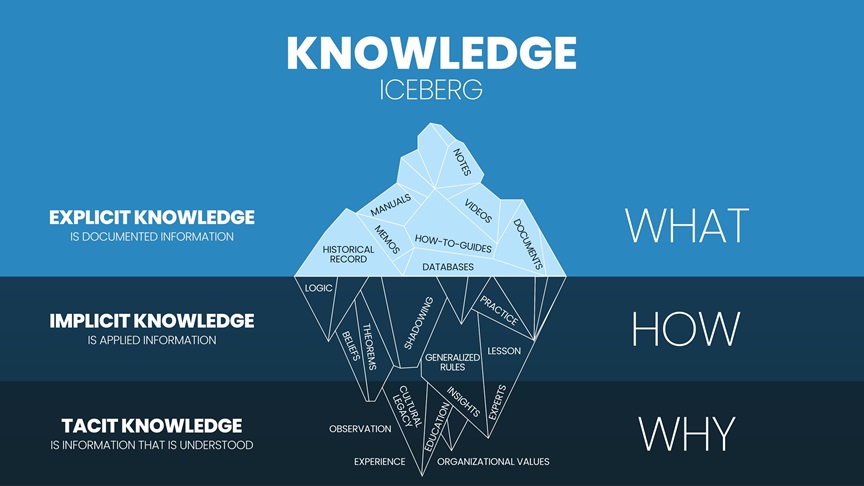In today's digitally-driven and rapidly evolving business landscape, knowledge isn't just power—when properly managed, it's the catalyst for innovation, strategic edge, and sustained success. However, not all knowledge is readily accessible or easily shared. Among the myriad forms of knowledge that organizations harbor, implicit knowledge stands as a silent powerhouse. It’s the unsung hero driving innovation, nurturing agility, and informing decision-making in many successful enterprises.
Unveiling the potential of implicit knowledge requires a deeper dive into the complex tapestry of organizational knowledge which is why we'll unravel the main characteristics of implicit knowledge as well as explore how it relates to tacit and explicit knowledge.
Let's take a closer look...
Diving Deeper: Understanding Implicit, Tacit, and Explicit Knowledge
Implicit knowledge, deeply ingrained within the fabric of organizational operations, often remains untapped yet holds transformative potential. Emerging from real-life situations and on-the-job learning, it embodies the practical "how" behind task execution, contrasting the codified "what" represented by explicit knowledge.
Some characteristics of implicit knowledge include:
- Experiential
- Internalized
- Action-Oriented (typically it pertains to the "how" of doing things)
- Unarticulated (while it's potentially expressible, implicit knowledge isn't documented like explicit knowledge)
- Transferable with Effort (unlike it's close counterpart tacit knowledge, which is deeply personal and extremely hard to transfer, implicit knowledge is easier to transfer, but does need effort to do so).
These characteristics highlight the nuanced and practical nature of implicit knowledge, setting the stage for a more detailed comparison among implicit, tacit, and explicit knowledge.
Looking more closely, the distinctions between implicit, tacit, and explicit knowledge unfold as follows:

- Implicit Knowledge: Often synonymous with tacit knowledge, it can be expressed but might not have been articulated. In organizational contexts, it's the procedural "how" learned through real-world experiences and interactions.
- Tacit Knowledge: This is personal, hard to articulate, and based on personal experiences. Michael Polanyi, the pioneer of this concept, implied that some or all tacit knowledge cannot be "told".
- Explicit Knowledge: This is knowledge that's articulated, codified, and shared in a formal manner. There's a debate on whether it encompasses only documented knowledge or also includes explainable knowledge that hasn't been recorded.
Implicit Knowledge vs Tacit Knowledge vs Explicit Knowledge: A Practical Example
Imagine a seasoned chef at a high-end restaurant. Over the years, she has honed her skills, developed her unique style, and accumulated a wealth of knowledge through diverse culinary experiences.
- Implicit Knowledge: Imagine our chef is tasked with creating a new signature dish. She might draw upon a blend of techniques learned over years in different kitchens. This includes understanding the balance of flavors, the reaction of ingredients to different cooking methods, or even the arrangement of items on a plate to enhance aesthetic appeal. This knowledge, accrued through practical experiences and interactions, has been internalized, although not always articulated. It's the "how" of creating a visually appealing and flavorful dish.
- Tacit Knowledge: Now, consider the intuition our chef has developed - the ability to adjust seasoning perfectly by taste, or to sense when a dish is cooked to perfection without using a timer. This tacit knowledge is deeply personal, hard to articulate, and even harder to transfer to others. It’s the instinctive finesse and artistry in her craft, something Michael Polanyi might say cannot be easily "told".
- Explicit Knowledge: Lastly, the restaurant’s recipe book is a form of explicit knowledge. It’s a codified collection of recipes, techniques, and standards that are shared across the kitchen staff. This knowledge is articulated, documented, and accessible to anyone who reads it. It's the "what" of the dishes – the ingredients, the steps, and the standards to be followed.
Through this lens, we can see the spectrum of knowledge our chef navigates daily, showcasing the interplay and distinctions between implicit, tacit, and explicit knowledge in a real-world scenario.
The Ambiguity and Debate: Codified vs. Uncodified Knowledge
The practical nuances observed in the previous example segue into a broader discussion surrounding the concepts of knowledge management.
Given the confusion surrounding the terms, especially implicit knowledge and tacit knowledge in practical scenarios, knowledge management expert Nick Milton has suggested using terms like "Codified" and "Uncodified" when discussing the various types of knowledge.
Regardless of terminology, each knowledge type demands unique strategies and tools for optimal management, and the culture of an organization invariably plays a critical role in how these strategies are implemented and how these tools are utilized.
Cultural Aspect for Making Best Use of Implicit Knowledge
The culture of an organization is a significant determinant in the successful translation of tacit to explicit knowledge. A culture that espouses open communication, collaboration, and continuous learning is often more adept at unlocking the reservoirs of implicit and tacit knowledge within its fold.
Leadership plays a pivotal role in shaping this culture. Leaders who champion knowledge sharing in the workplace and foster a conducive environment for open dialogue and learning invariably catalyze the flow of knowledge across the organizational landscape. They also set the tone for a more collaborative and innovative workforce by demonstrating a genuine appreciation for the collective wisdom and varied expertise within the organization.
Furthermore, organizational structures that promote cross-functional collaboration and decentralize decision-making often see a more vibrant exchange of ideas and knowledge. Such structures mitigate the silo effect, which can stymie the flow of knowledge, and promote a more holistic and integrated approach to problem-solving and innovation.
Creating a culture that values knowledge sharing and equips individuals with the necessary tools and platforms for knowledge retention and exchange is a strategic imperative. It not only unleashes the potential of implicit and tacit knowledge but also cultivates a more informed, innovative, and adaptable workforce capable of navigating the complexities of today’s business landscape.
While the cultural framework is the bedrock of knowledge utilization, technological advancements provide the tools to unlock and leverage this latent asset.
Practical Deployments: AI in Action
The convergence of artificial intelligence (AI) technologies with the realm of knowledge management exemplifies the significant strides in harnessing implicit knowledge through knowledge-based systems. Moreover, a recent study found that aligning efficient knowledge management with AI fosters organizational efficiency, effectiveness, and innovation, especially in new product development.
Some real-world applications of generative AI that showcase its prowess in capturing and leveraging implicit knowledge:
- Intelligent Generative Systems like GPT4 and its successors have powered AI-driven tutors, delivering context-aware insights, thus capturing the tacit knowledge of domain experts.
- Design Pattern Mining: Tools such as GitHub Copilot can discern and propagate design best practices throughout an organization.
- Patient Therapeutic Insights: AI models trained on vast clinical data can emulate a physician’s intuition, ensuring patients receive insights that previously relied on a doctor's long-acquired expertise.
- Fraud Detection and Scientific Knowledge Extraction: These serve as exemplary domains where AI systems tap into professionals’ innate insights, amplifying their impact.
Knowledge Base Software: The Codifying Cornerstone
In tandem with AI, knowledge base platforms emerge as a pivotal tool in the codification and dissemination of implicit knowledge. These types of knowledge management systems:
- Serve as repositories for implicit knowledge made explicit, ensuring a centralized hub for institutional memory.
- Facilitate collaboration and interaction, often catalyzing the tacit-to-explicit knowledge conversion process.
- Offer analytics and insights, helping organizations identify knowledge gaps and areas ripe for innovation.
Unlocking the Power of Implicit Knowledge
Understanding and harnessing implicit knowledge can be a game-changer. It’s about creating a culture of sharing and learning, underpinned by knowledge management technology, where the unspoken “know-how” is valued and leveraged for organizational success. This journey of knowledge transformation, from implicit to explicit, can significantly propel innovation, efficiency, and competitive advantage.
The marriage of cultural sensitivities with cutting-edge knowledge management tools is where the magic happens. Knowledge base software like Helpjuice not only facilitates the codification and dissemination of implicit knowledge but also serve as a crucible for collaborative innovation. The seamless exchange of ideas, the synergy between tacit and explicit knowledge, and the resultant organizational learning are the cornerstones of a sustainable competitive advantage in today’s knowledge-driven economy.
Invest in unlocking the implicit knowledge within your organization through robust knowledge management tools. The rewards in innovation, efficiency, and a resilient, adaptable workforce are boundless. And the journey could begin with a simple step.
Take Action Today: Harness the Power of Knowledge with Helpjuice
Embark on a transformative journey of knowledge management with Helpjuice. Our platform is designed to capture, manage, and leverage your organization’s collective wisdom, turning implicit knowledge into a tangible asset. Experience the ease of collaborative learning, the efficiency of streamlined knowledge sharing, and the innovation spurred by a culture of open communication.
Discover how Helpjuice can catalyze your organization’s knowledge management initiatives. Take advantage of our 14-day free trial and explore a world of possibilities in harnessing the untapped potential of implicit knowledge. Your pathway to a more informed, innovative, and competitive organization is just a click away.





